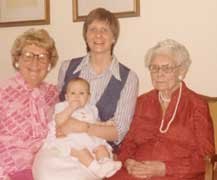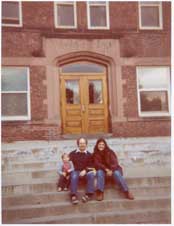Family Ties: Vassar Legacies
Such announcements and queries are common in Class Notes. A few correspondents might be surprised to discover the amazing accuracy of their soothsaying. For some of those precious babies, like Isaac Scranton or Sarah Hanson, the good-natured and hopeful query of a class correspondent or parent may be an accurate prophecy. Members of the classes of 2003 and 2004, respectively, Scranton and Hanson are Vassar legacies — children, grandchildren, or great-grandchildren of Vassar alumnae or alumni.
According to David Borus, dean of admission and financial aid, about 30 students in each class of the past five years — 4 to 5 percent — have been legacies. For the incoming class of 2005, the number of legacies is 42 students — 6 percent of the incoming class — a record number for Vassar. And, in a reflection of the increasing presence of men among Vassar alumni (men now comprise about 20 percent of all Vassar alumni), the number of what the college calls double legacies — a child whose mother and father are graduates — has been growing, as has the number of students whose only link to the college is through a father.

4 generations of Vassar Grads: Jean, Connie (with Sarah) and Mary
Being the son or daughter of a Vassar graduate does not guarantee admission to the college — legacies must pass the rigorous tests for admission that are required of others — but it is an advantage when the selection committee chooses from the pool of qualified applicants, Borus acknowledges. He says that legacies are admitted at a higher rate than are students from the general pool. "We feel that at a school like Vassar tradition and continuity are very important," he explains. Legacies are tangible evidence of Vassar’s reputation as a quality institution of higher learning. "They are a testament to the value of a liberal arts education and the progressive atmosphere that Vassar provides," says Sarah Hanson, a fifth generation Vassar student.
Family ties do not always bind offspring to a previous generation’s alma mater, of course. In fact, those very connections may be viewed negatively by potential students. Sarah Hanson, for example, admits she threatened to refuse Vassar just because of her legacy status.
"I didn’t want to be the kind of person who just blindly followed family tradition. But to my dismay," she confesses with mock distress, "when I visited, I found Vassar was everything I wanted in a school."

"For us, Vassar is our ancestral home," says Risa Scranton, "our shared and common background."
Son Isaac takes a moment to consider the possibility of his own Vassar legacies. "I suppose if I marry another Vassar graduate," he says, "my children will be like salmon, swimming upstream to spawn." If it’s an instinct, it’s one that would be welcomed by Vassar — the children of alumnae/i swimming determinedly home to alma mater.
